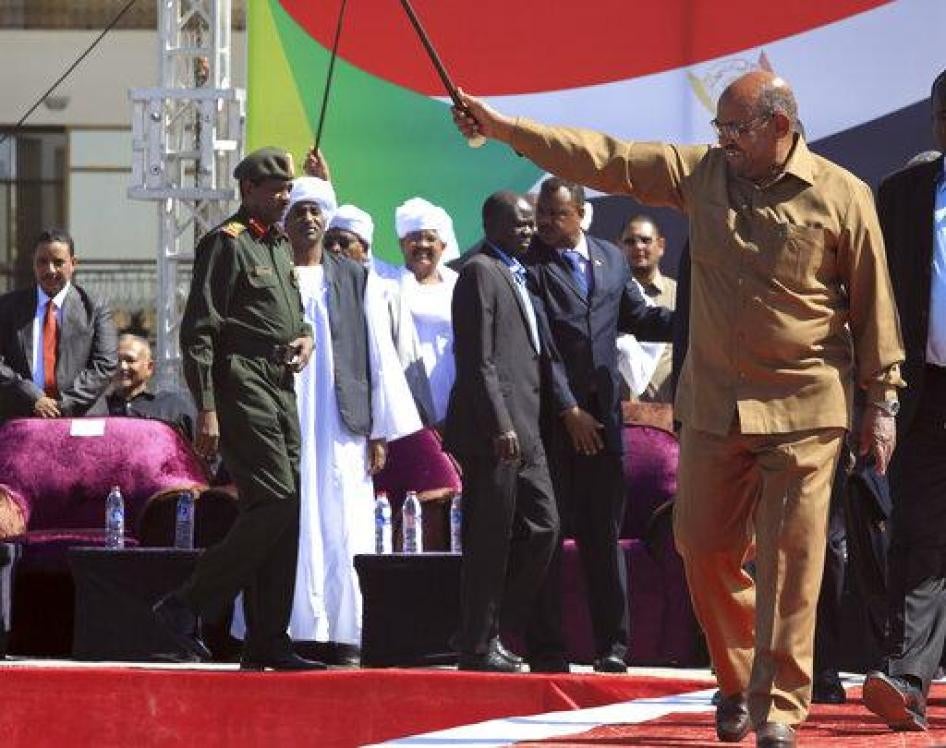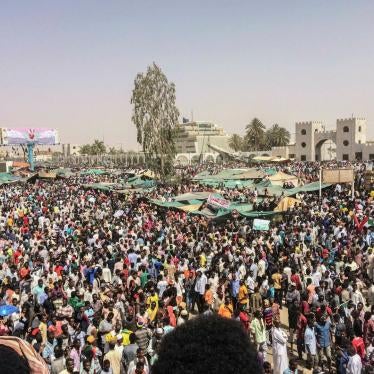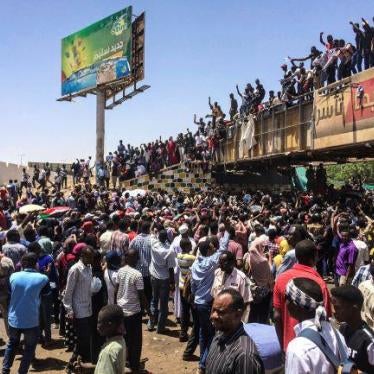(Nairobi) – Sudan’s transitional military council should uphold their commitments to human rights and justice for past crimes by transferring Omar al-Bashir, the deposed president, and other Sudanese fugitives to the International Criminal Court (ICC). ICC states parties should step up pressure on the council to surrender al-Bashir and other war crimes suspects to the Hague court without any further delay.
On April 17, 2019, media reported that al-Bashir was being held in Kobar prison, in Khartoum. The transitional military council has said they would not hand al-Bashir over to face justice at the ICC, but could try him at home or a forthcoming civilian government could do so.
“The news of al-Bashir’s detention adds a new twist to unfolding events in Sudan and reinforces protesters’ calls for justice and accountability,” said Jehanne Henry, associate Africa director at Human Rights Watch. “ICC states parties should use all inroads in Khartoum to secure the surrender of ICC fugitives to the Hague court, and take steps to address decades of repression and abuse.”
Since the council assumed control, the authorities have released many detainees, including Darfuri students held without charge since protests in December 2018, and have largely refrained from violently dispersing protests. But the authorities have yet to make clear their plans to hold accountable key figures who oversaw serious crimes in Darfur, Southern Kordofan, and elsewhere, or the killing of protesters.
Protests have continued, with calls for the immediate transfer of power to civilian rule, as well as for the arrest of all leaders of the former ruling National Congress Party (NCP) and former heads of Sudan’s national security agency, the National Intelligence and Security Service (NISS). Protesters have also called for justice for a range of human rights violations, including protester killings, atrocities in Darfur and Port Sudan, and other crimes by al-Bashir’s government.
Protests have taken place in major Sudanese cities since mid-December, both in response to Sudan’s declining economy and for an end to al-Bashir’s rule. Sudanese security forces cracked down violently on those protests, using excessive lethal force to kill scores of protesters and rounding up hundreds, possibly thousands, for arrest and detention.
Sudanese monitors on the ground estimate that more than 100 protesters have been killed, including many since April 6, when protesters converged on the army headquarters in Khartoum prompting al-Bashir’s ouster. Media reported that in Darfur, at least nine people have been killed in crackdowns over the past week.
Al-Bashir was ousted on April 11, when then-Vice President and Defense Minister Awad Ibn Ouf dissolved Sudan’s government, suspended its constitution, and announced that a military council would take over for a two-year transitional period. He said al-Bashir was under house arrest in a “safe place.” The next day, Ibn Ouf, who is among the Sudanese officials under sanction by the United States government for crimes in Darfur, resigned and was replaced by Abdel Fattah al-Burhan, the inspector general of the armed forces and the commander of Sudanese forces fighting in the Saudi-led coalition’s war in Yemen.
Salah Gosh, the head of Sudan’s draconian NISS, also resigned. Gosh oversaw NISS from 2004 to 2009 and again from 2018 to 2019. He oversaw forces who cracked down with lethal violence on several protests, including in recent months and in September 2013 when security forces opened fire on protesters killing more than 170 on the streets of Khartoum, Omdurman, and other cities.
On April 13 in a speech as head of the military council, al-Burhan lifted the curfew imposed by al-Bashir, and pledged respect for human rights, accountability for corruption, and justice for killings of protesters and other human rights violations, among other promises. He said that some members of the former ruling NCP had been arrested. The council has since dismissed several top officials, including the prosecutor general.
However, the council named Mohamed Hamdan Dagalo, “Hemeti,” the commander of the abusive Rapid Support Forces (RSF), as al-Burhan’s deputy. Human Rights Watch and others have documented serious crimes by the RSF in Darfur and conflict zones in Southern Kordofan and Blue Nile since 2013. It is also part of the Saudi-led coalition war in Yemen. Hemeti’s role as deputy head of the transitional military council should not make him immune to accountability for the crimes of forces he commanded, Human Rights Watch said.
Human Rights Watch has documented grave human rights violations and potential war crimes in Darfur, Southern Kordofan, and Blue Nile, as well as patterns of repression across the country, including killing protesters.
Al-Bashir is facing charges of genocide, crimes against humanity, and war crimes at the ICC based on attacks against civilians in Darfur dating back to 2002 contained in an arrest warrant issued in 2009 and a second warrant issued in 2010.
ICC arrest warrants for four other Sudanese suspects are outstanding. These are for Ahmed Haroun, who was acting head of the NCP and former governor of Southern Kordofan state; Abdulraheem Mohammed Hussein, the former defense minister; Ali Kosheib, a militia leader; and Abdallah Banda Abakaer, leader of the Justice and Equality Movement (JEM), a rebel group in Darfur.
On March 31, 2005, the United Nations Security Council mandated the ICC prosecutor to investigate crimes in Darfur under resolution 1593. Sudan is not an ICC member.
“The dramatic developments in Sudan herald new openings to do right by victims of the violent crackdowns on protests and other crimes against civilians for the last three decades,” said Henry. “The transitional military council should act on its promises by handing al-Bashir and the others facing ICC arrest warrants over to the court at once and by investigating and prosecuting other abuses.”









